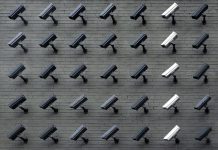As the FBI continues to get the bottom of December’s tragic shooting in San Bernardino, Calif., Apple CEO Tim Cook has taken a stand against a specific request that he feels would jeopardize the security of iPhone users everywhere. The kicker? He may be right.
Tim Cook said Tuesday that the billion-dollar tech giant will oppose a federal judge’s ruling ordering them to help the FBI break into an iPhone owned by Syed Rizwan Farook, one of the San Bernardino shooters. From USA Today:
“‘We have great respect for the professionals at the FBI, and we believe their intentions are good. Up to this point, we have done everything that is both within our power and within the law to help them,’ Cook wrote in a letter published on the Cupertino, Calif.-headquartered firm’s website.
‘But now the U.S. government has asked us for something we simply do not have, and something we consider too dangerous to create.”
That thing Apple considers too dangerous to create is a “backdoor to the iPhone.” What that means is the FBI wants Apple to create a new version of the iPhone operating system (iOS) that circumvents many important security features currently enjoyed by iPhone users. Further, the FBI wants Apple to install this remarkably less secure iOS on Farook’s iPhone, giving them the ability to break into it without fear of the phone locking and all the data being deleted after several unsuccessful password attempts.
This is the iPhone’s key security feature.

Tim Cook believes that the creation of an iOS devoid of key security features would be devastating all iPhone users. From The Atlantic:
“In the wrong hands, this feature — which does not exist today — would have the potential to unlock any iPhone in someone’s physical possession.”
But not everyone shares Tim Cook and Apple’s concern. On Tuesday, Magistrate Judge Sheri Pym ordered Apple to “supply highly specialized software the FBI can load onto the phone to cripple a security encryption feature that erases data after too many unsuccessful unlocking attempts.” If Apple were to comply with the ruling, the FBI would be able to attempt unlocking the phone using as many attempts as they need, a form of data cracking known as “bruteforcing.”
How would this affect the estimated 75.23 million iPhone users in the United States, as well as those abroad? According to a statement Tim Cook released on Apple’s website, addressed to Apple’s customers:
“Some would argue that building a backdoor for just one iPhone is a simple, clean-cut solution. But it ignores both the basics of digital security and the significance of what the government is demanding in this case.
In today’s digital world, the ‘key’ to an encrypted system is a piece of information that unlocks the data, and it is only as secure as the protections around it. Once the information is known, or a way to bypass the code is revealed, the encryption can be defeated by anyone with that knowledge.
The government suggests this tool could only be used once, on one phone. But that’s simply not true. Once created, the technique could be used over and over again, on any number of devices. In the physical world, it would be equivalent of a master key, capable of opening hundreds of millions of locks — from restaurants and banks to stores and homes. No reasonable person would find that acceptable.
The government is asking Apple to hack our own users and undermine decades of security advancements that protect our customers — including tens of millions of American citizens — from sophisticated hackers and cybercriminals. The same engineers who built the strong encryption into the iPhone to protect our users would, ironically, be ordered to weaken those protections and make our users less safe.”
Tim Cook’s statement also points out that the FBI is proposing “an unprecedented use of the All Writs Act of 1789 to justify an expansion of its authority.” His words display a fear of government overreach, which doesn’t seem to be all that unfounded, considering the U.S. government does have a history of spying on its citizens, notably through the PRISM program (information from which was leaked by Edward Snowden).
Tim Cook’s statement goes into chilling detail about what he believes could be the implications if the government gets its way and successfully forces Apple to backdoor the iPhone under the All Writs Act of 1789. He writes that “if the government can use the All Writs Act to make it easier to unlock your iPhone, it would have the power to reach into anyone’s device to capture their data.” He elaborates, stating that the government “could expand this breach of privacy and demand Apple build surveillance software to intercept your messages, access your health records or financial data, track your location, or even access your phone’s microphone or camera without your knowledge.”
All in the name of “national security,” I suppose. Even though the government has been careful to state that they want special software specifically for Farook’s iPhone, civil liberties advocates are concerned that the request is a “slippery slope.” But then again, aren’t nearly all the things the U.S. government does in the name of national security a “slippery slope?”
Image by Marcus Quigmire, available under a Creative Commons Attribution-ShareAlike 2.0 Generic license.





